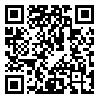Articles accepted at the time of publication
Back to the articles list |
Back to browse issues page
1- Department of English, Faculty of Literature, Alzahra University, Iran
2- Department of English, Faculty of Literature, Alzahra University, Tehran, Iran ,susanmarandi@alzahra.ac.ir
2- Department of English, Faculty of Literature, Alzahra University, Tehran, Iran ,
Abstract: (324 Views)
In this study, Virtual Reality (VR) was employed in an English course intended to promote oral presentation skills in Iranian academia, and the possible impact of the course on learners’ self-efficacy regarding presenting, Foreign Language Anxiety (FLA), and speaking skills was investigated. Eight participants attended a 6-session course, and practiced academic oral presentation in a virtually simulated environment. Prior to the course, semi-structured interviews were administered; in addition, participants’ weekly reflection notes and self-assessments were gathered throughout the course. Moreover, post-course semi-structured interviews and written follow-up interviews were conducted afterward. The findings revealed that the learners reported higher levels of self-efficacy regarding presenting after the course, due to a perceived improvement in their presenting style, as well as their presentation content and slides. Additionally, the course had contributed to lowering the learners’ FLA due to presence in the Immersive Learning Environment (ILE), ample practice opportunities, and collaborative avatar interactions. Moreover, the learners mentioned that the course had helped them to improve their speaking skills due to academic vocabulary expansion, pronunciation enhancement, fluency upgrade, and grammatical adjustment. The findings can provide insights for language educators with regard to the use of virtual reality for simultaneously fostering language and academic skills, as well as facilitating internationalization in higher education.
Keywords: virtual reality, higher education, academic oral presentation, self-efficacy, foreign language anxiety (FLA), EAP
Article Type: Research article |
Subject:
English language
Send email to the article author
| Rights and permissions | |
 |
This work is licensed under a Creative Commons Attribution-NonCommercial 4.0 International License. |






